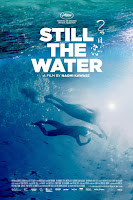March '23 Digital Week I
- Details
- Parent Category: Film and the Arts
- Category: Reviews
- Published on Wednesday, 08 March 2023 20:29
- Written by Kevin Filipski
Film, the Living Record of Our Memory
(Kino Lorber)
In director Inés Toharia’s cautionary chronicle about the urgency of film preservation—in one of the film’s many eye-opening statistics, it’s noted that more than three-quarters of all films from the silent era are gone forever—archivists, filmmakers and historians discuss an unexciting but concerning subject for any cinema lover.
It’s also pointed out that saving films digitally isn’t a panacea, since—as anybody who has tried to watch a movie on an older DVD can attest—digital media deteriorates as badly as film does. What to do? That’s the question, and whatever the answer, it had better happen soon: we are in danger of losing a lot of more of our shared film history. Among the articulate talking heads are directors Ken Loach, Wim Wenders and—of course—the ubiquitous Martin Scorsese.
(Kino Lorber)
Set in Berlin in 1940, director Maggie Peren’s tense but playful drama follows Cioma Schönhaus, who joins the burgeoning underground to uses his expertise at forging documents for other Jews trying to escape the Nazis before it’s too late—but his bold, even reckless, flaunting of his own excitement for life, even falling in love with an unavailable woman, puts a bullseye on his back.
Peren’s engrossing film from a real-life subject reflects its protagonist’s almost carefree joie de vive but never loses sight of its tragic center. Louis Hofmann is excellent in the lead role, a deceptively complicated character.
(Indiecan Entertainment)
Set in the cutthroat world of figure skating, Roope Olenius’ rugged feature concerns a young Russian—called only the Figure Skater—who goes to Finland to live with her grandmother while taking up skating again, but as she ascends to greater heights on the ice she sees that her position is precarious, especially when it comes to those who would use her for their own ends.
Veera W. Vilo, who is impressive in the lead, also wrote the scathing script, which never shies away from showing the worst of the sport: from physical and emotional bullying to sexual assault, it’s all here.
(Oscilloscope)
Helmut Dosantos’ visually rich documentary, which unveils the natural beauties of the director’s beloved homeland, alternates between crisp black and white and richly textured color as it shows the indigenous denizens of varied rural areas at work and at leisure, in a sense resisting the modernization that has become the norm elsewhere.
Dosantos (who is also his own cinematographer) has made a nearly abstract visual and aural essay that at times becomes didactic and repetitious but retains a compelling fascination throughout.
(Film Movement)
Japanese writer-director Naomi Kawase makes intimate dramas about relationships, like this 2014 feature about teenage lovers who, after discovering a dead body floating in the sea, discover a new-found maturity that may help them on the path to adulthood.
As always, Kawase too often relies on sentimentality and contrived plotting but, unlike an affecting film like True Mothers, here she has made what isn’t much more than a well-acted soap opera. Certainly, it’s not the masterpiece the director herself thought of it at its premiere at Cannes.
La vie parisienne
(Opus Arte)
French operetta composer Jacques Offenbach reached his storytelling zenith with this work about quotidian life and love in the greatest of all cities—it’s not titled “Parisian Life” for nothing. And this delectable staging at, appropriately enough, the Theatre des Champs-Elysees in Paris, is frothy, fizzy fun.
Director Christian Lacroix’s dazzling sets and costumes perfectly complement Offenbach’s beguiling music (played by Les Musiciens du Louvre under the baton of conductor Romain Dumas), and it’s charmingly sung by a superlative cast. There’s first-rate hi-def video and audio.
Alexander Scriabin—The Poem of Ecstasy/Symphony No. 2
(Naxos)
Alexander Scriabin gets short shrift among his Russian contemporaries, possibly because he didn’t write operas like Mussorgsky, Borodin or Rimsky-Korsakov. But his music has a voluptuousness all its own, and the two orchestral works on this disc show off how his rapturous style evolved.
The aptly titled The Poem of Ecstasy and his Symphony No. 2 were written within a few years of each other in the early 1900s, but Ecstasy is far more chromatic; JoAnn Falletta conducts the Buffalo Philharmonic Orchestra in rousing performances that catch all the nuances of these towering works.







